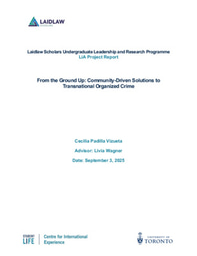Overview of Week 4
Week 4 was transformative on many levels. We went to the United Nations headquarters in Vienna to support negotiations on the Convention against Cybercrime and the preparations for the Fifteenth Crime Congress. We were able to sit in UNODC sessions part of the final push to refine the Hanoi Convention before it opens for signature in Hanoi in October 2025. This was my first time observing a UN meeting, and I joined bilateral consultations, side events and informal discussions with diplomats and civil‑society representatives.
What went well?
This week exceeded my expectations for my LiA experience. I was trusted to take notes during meetings and occasionally brief our delegates before sessions. Drawing on my Week 2 matrix, I could anticipate states’ interventions and suggest talking points advocating for human‑rights safeguards and civil‑society involvement to GI-TOC's speakers in the meeting. When GI‑TOC staff presented the organization’s views, they stressed that the convention should not be abused to criminalize ordinary online activities or target journalists, an insight I stressed on our internal reports and conversations. Overall, observing how negotiators balanced legal nuance with political realities widely deepened my understanding of multilateral diplomacy.
What could have gone differently?
At times I felt overwhelmed by the formality and pace of UN proceedings. Truthfully, I hesitated to network beyond our immediate delegation due to nerves. Next time I will focus on build relationships with other NGOs as well.
What did I learn about myself when working with others?
This week showed me I am capable of adapting to new environments in a fast pace. Despite initial nerves, I quickly learned UN etiquette and found ways to contribute. The week showed me that bravery is not the absence of fear but the willingness to act despite it. By the end of the week I felt more comfortable voicing observations/thoughts and questions in debriefs with colleagues and new contacts.
What did I learn about leadership?
I learned that leadership is often about presence and active listening. In negotiations, the most effective delegates asked insightful questions and genuinely considered others’ viewpoints. I also saw how GI‑TOC leverages its credibility to open space for civil‑society voices, echoing its strategy to advocate for making civil‑society voices heard in multilateral platforms. This experience reaffirmed that ethical leadership involves amplifying marginalized perspectives, not just promoting one’s own agenda.
What do I want to develop or focus on next?
In the next weeks, I aim to apply what I learned about diplomacy to my ongoing tasks. I will also begin drafting a blog post on human‑trafficking flows from South America to Europe.

Please sign in
If you are a registered user on Laidlaw Scholars Network, please sign in